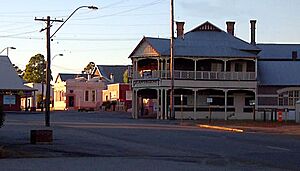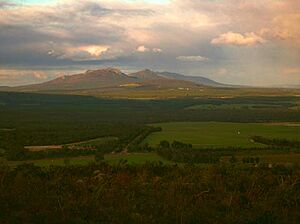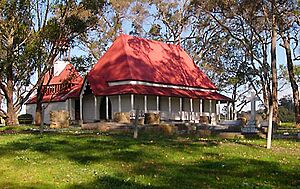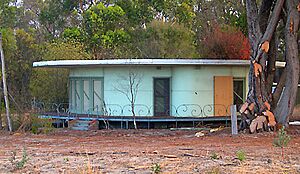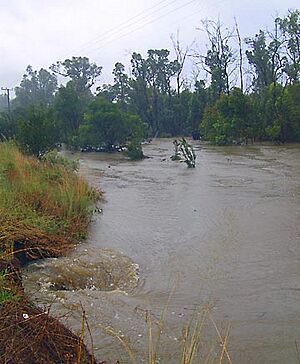Mount Barker, Western Australia facts for kids
Quick facts for kids Mount BarkerWestern Australia |
|||||||||||||||
|---|---|---|---|---|---|---|---|---|---|---|---|---|---|---|---|
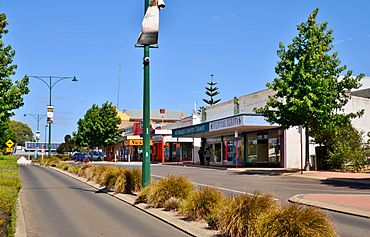
Lowood Road, Mount Barker, 2018
|
|||||||||||||||
| Established | 1892 | ||||||||||||||
| Postcode(s) | 6324 | ||||||||||||||
| Elevation | 300 m (984 ft) | ||||||||||||||
| Area | [convert: needs a number] | ||||||||||||||
| Location | |||||||||||||||
| LGA(s) | Shire of Plantagenet | ||||||||||||||
| State electorate(s) | Warren-Blackwood | ||||||||||||||
| Federal Division(s) | O'Connor | ||||||||||||||
|
|||||||||||||||
|
|||||||||||||||
Mount Barker is a town and area in the Great Southern region of Western Australia. It's the main town for the Shire of Plantagenet. In 2021, about 2,855 people lived there.
The town got its name from a nearby hill. This hill was named in 1829 by Thomas Braidwood Wilson. He honored Captain Collet Barker, who was in charge of the first British settlement at King George's Sound from 1829 to 1831.
Contents
Where is Mount Barker Located?
Mount Barker is found on Albany Highway. It is about 363 kilometers (226 miles) southeast of Perth. The town is also 50 kilometers (31 miles) north of the city of Albany.
The coastal town of Denmark is about 55 kilometers (34 miles) southwest by road. You can reach it using the Denmark to Mount Barker Road. The timber town of Manjimup is 160 kilometers (99 miles) west of Mount Barker. You get there by taking Muir Highway. The Hay River starts just west of Mount Barker and flows into Wilson Inlet at Denmark.
What is the History of Mount Barker?
Before Europeans arrived, small groups of Bibbulmun People lived here. They moved through the area with the seasons. The Aboriginal name for Mount Barker Hill is 'Pwakkenbak'.
In December 1829, Mount Barker was named. It was named after Captain Collet Barker. He was the leader of the King George Sound military post. Naval surgeon Thomas Braidwood Wilson gave it the name. Wilson explored the area with Mokare, a Noongar man from King George Sound.
European settlers started arriving in the Hay River area around the 1830s. The opening of the Perth/Albany Railway in 1889 helped the town grow. The first store opened in 1890. More people moved there in the 1890s. The first school and town hall opened in 1893. By 1898, the town had 326 people.
What Industries are in Mount Barker?
Apple orchards used to be a major industry here. They did very well until the mid-1960s. Today, farming is still important.
Main Agricultural Activities
- Grape Growing (Viticulture): This is for making wine.
- Crops: Wheat and canola are grown.
- Timber: Trees are grown for wood.
- Livestock: Sheep and cattle are raised.
The Plantagenet Shire runs the Great Southern Regional Cattle Saleyards. These yards help cattle farmers from the area and beyond.
Mount Barker is also home to The Banksia Farm. This farm has every known type of Banksia plant. It also has most types of Dryandra.
Tourism and Local Products
The Stirling and Porongurup Range National Parks are nearby. These parks, along with the local wine industry, help tourism grow. You can find places to stay like motels, caravan parks, and farm-stays.
Many people are moving from cities to the countryside. This has led to more small businesses. These businesses offer many art and craft products.
A quarry east of town produces a special stone called spongolite. It's also known as "Mount Barker Stone." This stone is used for its ability to absorb liquids. It's also cut into bricks for building. Examples include the Plantagenet Players Theatre and Hillside House in Albany. The Aquinas College Chapel in Perth is made from the red type of this stone.
In 2011, a wind farm was built 4 kilometers (2.5 miles) north of Mount Barker. It has three tall wind turbines. These turbines help provide power to the town.
Mount Barker Wine Region
Mount Barker is part of the Great Southern wine region. This is Australia's largest wine region. It's known as the 'birthplace of the Great Southern wine region'. The area has won many awards for its wines.
The climate here is good for growing Riesling and Shiraz grapes. It gets most of its rain in winter and spring. Plantagenet Wines started in 1968. It was one of the first wineries in the region and is located right in town.
What are the Features of Mount Barker?
The top of Mount Barker hill is 3.5 kilometers (2.2 miles) southwest of the town. It is 404 meters (1,325 feet) above sea level. A paved road goes to the base of a radio and television tower on the hill. The tower was built in 1966 and made taller in 2001.
From the top, you can see the Stirling Range to the north. You can also see the Porongurup Range to the east. On clear days, you can even see the Albany Wind Farm 45 kilometers (28 miles) away. In summer, the lookout is used to watch for bushfires.
Historical Buildings and Places
Mount Barker has many old and interesting buildings:
- St Werburghs Chapel: This chapel was built in 1872. Its walls are made from straw and clay. The wood is from local jarrah trees. A small cemetery is also there. Volunteers help keep the chapel running. It is a popular place for tourists. Services are held once a month, and there are special Christmas events.
- Old Police Station: Opened in 1868, it is now a museum.
- Mount Barker Post Office and Telegraph Station: Built in 1892, it closed in the 1960s. Now called 'Mitchell House', it is home to the local art society and gallery.
- Plantagenet Hotel: Built between 1912 and 1914. Its design includes apple shapes. This celebrates the apple industry that used to be very big here. The hotel is still open today.
- Town Railway Building: Built in 1923, it was fixed up in 1997. Today, it is the Mount Barker Visitor Centre. Here you can find information about local tourism.
- The Round House:
This unique circular house was built in the late 1950s or early 1960s. It was designed by Hubertus Johannes Van der Kolk. The house could turn 180 degrees to get the best sunlight or shade. This made it very energy-efficient. It was hidden by trees for many years. Now, it can be seen again. The house has been fixed up. However, the turning part cannot be repaired. The Heritage Council has written a detailed history of this special building.
- Old Farmhouses: The farming areas around the town have many old farmhouses, sheds, and machinery.
Nearby Natural Attractions
The Stirling Range is about 40 kilometers (25 miles) northeast of town. The Porongurup Range is a 15-minute drive to the east. These two mountain ranges look very different. They also have different plants and rocks. Both parks have walking trails. These are very popular during the spring wildflower season, from August to November. The Porongurup Range has a new "Granite Skywalk." This gives hikers amazing views from the Castle Rock trail.
What Schools are in Mount Barker?
Mount Barker Community College is a school that includes both primary and secondary levels. It is located on the same campus. The college is off Albany Highway on Woogenellup Road.
Mount Barker Community College opened in 2015. Before that, it was known as Mount Barker Senior High School.
What Media is Available in Mount Barker?
Mount Barker has several radio stations. These include 783 Triple M, Vision FM, HitFM, ABC South Coast, ABC NewsRadio, ABC Radio National, ABC Classic FM, and Triple J.
Here are the broadcast frequencies for these services:
| Service | Broadcast Frequency |
|---|---|
| ABC Local Radio | 630 kHz AM |
| 783 Triple M | 783 kHz AM |
| ABC News | 92.1 MHz FM |
| Triple J | 92.9 MHz FM |
| Vision Christian Radio | 93.7 MHz FM |
| ABC Classic FM | 94.5 MHz FM |
| HitFM | 95.3 MHz FM |
| ABC Radio National | 96.9 MHz FM |
Local television stations in Mount Barker include GWN7 (now Seven Regional), WIN Television Western Australia, West Digital Television, SBS, and ABC Television Western Australia. Seven (formerly GWN7) has a local news program. It is called Seven News Regional WA and airs at 5:30pm on weekdays.
Here are the digital television services available in Mount Barker: These services are broadcast from Mount Barker Hill. They cover most of the area. Some people get these services by satellite using the Viewer Access Satellite Television (VAST) system.
| LCN | Channel Name | Broadcast Ch. No. | Broadcast frequency |
|---|---|---|---|
| 2 | ABC TV | VHF 11 | 219.5 MHz |
| 3 | SBS | VHF 10 | 212.5 MHz |
| 5 | 10 HD | VHF 12 | 226.5 MHz |
| 6 | 7HD Regional WA | VHF 6 | 177.5 MHz |
| 8 | Channel 9 | VHF 8 | 191.5 MHz |
| 20 | ABC HD | VHF 11 | 219.5 MHz |
| 21 | ABC TV | VHF 11 | 219.5 MHz |
| 22 | ABC TV Plus/KIDS | VHF 11 | 219.5 MHz |
| 23 | ABC ME | VHF 11 | 219.5 MHz |
| 24 | ABC NEWS 24 | VHF 11 | 219.5 MHz |
| 30 | SBS HD | VHF 10 | 212.5 MHz |
| 31 | SBS VICELAND | VHF 10 | 212.5 MHz |
| 32 | SBS WORLD MOVIES | VHF 10 | 212.5 MHz |
| 33 | SBS FOOD | VHF 10 | 212.5 MHz |
| 34 | NITV HD | VHF 10 | 212.5 MHz |
| 35 | SBS WORLD WATCH | VHF 10 | 212.5 MHz |
| 36 | NITV | VHF 10 | 212.5 MHz |
| 50 | 10 BOLD | VHF 12 | 226.5 MHz |
| 55 | 10 Peach | VHF 12 | 226.5 MHz |
| 62 | 7two Regional WA | VHF 6 | 177.5 MHz |
| 64 | 7mateHD Regional WA | VHF 6 | 177.5 MHz |
| 67 | ishop TV | VHF 6 | 177.5 MHz |
| 68 | RACING.COM | VHF 6 | 177.5 MHz |
| 80 | 9HD | VHF 8 | 191.5 MHz |
| 81 | 9Gem | VHF 8 | 191.5 MHz |
| 82 | 9Go! | VHF 8 | 191.5 MHz |
| 84 | TVSN | VHF 8 | 191.5 MHz |
| 85 | 9Life | VHF 8 | 191.5 MHz |
What Facilities are in Mount Barker?
Mount Barker has a hospital and medical center. It also has a police station and a TAFE College. There is a community college for all school ages (Kindergarten to Year 12). Childcare facilities are available too. Groups like Scouts and Girl Guides are active. New shire offices opened in 2006.
In 2004, the state government planned the Mount Barker Community College. This project aimed to put all public schooling in one place. This includes kindergarten up to TAFE. Work started in 2007. Now, all parts of the college are complete. This includes a new Trade Training Centre.
Mount Barker has shops, businesses, and industrial areas. These serve as a center for the Plantagenet Shire.
Sports and Recreation
Sporting facilities include:
- A football ground (Sounness Park), home of the Mount Barker Football Club.
- A modern indoor recreation center and gym.
- A 50-meter outdoor swimming pool.
- A speedway track.
- A horse-racing track (Frost Park).
- A skate park.
Popular sports are Australian Rules Football, rugby union, cricket, and horse riding (equestrian pursuits).
Culture and Community
Besides the public library, Mount Barker has cultural facilities. There is a public art gallery. It shows and sells works by local artists. There is also a popular amateur theatre company. It is called "The Plantagenet Players." Its members range from nine years old to seniors.
Emergency services in town include Police and volunteer groups. These are St John Ambulance, the Fire & Rescue Service, Bush Fire Service, and State Emergency Service. The Shire and State Government provide training and equipment. Many charity groups are also active. These include Rotary, Lions, Red Cross, and Anglicare.
The Great Southern Railway runs through town. It started operating in 1889. This helped the region grow. Now, there are no passenger trains. The line is mainly used to carry grain to Albany Port. The train passes a few times a day. It makes a loud noise that can be heard throughout the town.
Pardelup Prison is located near Denbarker, west of Mount Barker.
People in Mount Barker, Western Australia, often find their town confused with Mount Barker, South Australia. This happens a lot when they talk to national call centers.
What is the Climate Like in Mount Barker?
Mount Barker has a mild climate. Summers are warm, and winters are mild to cold. Summer temperatures can sometimes go above 40 degrees Celsius (104 degrees Fahrenheit). But they usually average around 26 degrees Celsius (79 degrees Fahrenheit). Winter nights can drop to 0 degrees Celsius (32 degrees Fahrenheit). Daytime winter temperatures average around 10-15 degrees Celsius (50-59 degrees Fahrenheit).
Rainfall averages about 24 millimeters (0.9 inches) in January. It can be over 100 millimeters (3.9 inches) in July.
| Climate data for Mount Barker (1886–2013) | |||||||||||||
|---|---|---|---|---|---|---|---|---|---|---|---|---|---|
| Month | Jan | Feb | Mar | Apr | May | Jun | Jul | Aug | Sep | Oct | Nov | Dec | Year |
| Record high °C (°F) | 43.9 (111.0) |
43.6 (110.5) |
40.6 (105.1) |
37.2 (99.0) |
32.2 (90.0) |
24.3 (75.7) |
22.2 (72.0) |
25.0 (77.0) |
29.3 (84.7) |
35.6 (96.1) |
39.4 (102.9) |
42.9 (109.2) |
43.9 (111.0) |
| Mean daily maximum °C (°F) | 26.2 (79.2) |
26.0 (78.8) |
24.2 (75.6) |
21.2 (70.2) |
17.8 (64.0) |
15.3 (59.5) |
14.3 (57.7) |
15.0 (59.0) |
16.8 (62.2) |
18.8 (65.8) |
21.8 (71.2) |
24.2 (75.6) |
20.1 (68.2) |
| Mean daily minimum °C (°F) | 12.8 (55.0) |
13.1 (55.6) |
12.4 (54.3) |
10.7 (51.3) |
8.8 (47.8) |
7.1 (44.8) |
6.1 (43.0) |
6.1 (43.0) |
6.9 (44.4) |
8.0 (46.4) |
9.9 (49.8) |
11.4 (52.5) |
9.4 (48.9) |
| Record low °C (°F) | 1.7 (35.1) |
4.0 (39.2) |
3.6 (38.5) |
2.2 (36.0) |
0.6 (33.1) |
−1.1 (30.0) |
−2.2 (28.0) |
−1.3 (29.7) |
−0.6 (30.9) |
0.1 (32.2) |
1.1 (34.0) |
1.1 (34.0) |
−2.2 (28.0) |
| Average rainfall mm (inches) | 23.3 (0.92) |
23.9 (0.94) |
36.4 (1.43) |
54.2 (2.13) |
82.7 (3.26) |
95.3 (3.75) |
103.4 (4.07) |
89.0 (3.50) |
79.2 (3.12) |
68.6 (2.70) |
43.0 (1.69) |
29.5 (1.16) |
728.5 (28.67) |
| Average rainy days (≥ 0.2mm) | 7.7 | 7.3 | 9.8 | 12.5 | 16.3 | 18.8 | 20.3 | 19.7 | 17.5 | 15.6 | 11.2 | 9.1 | 165.8 |
| Source: Bureau of Meteorology | |||||||||||||
Significant Weather Events
- Snowfall: Light snow is common on the Porongurup and Stirling Range peaks. But snow rarely falls to the ground in Western Australia. However, snow has fallen in Mount Barker several times. On August 28, 1992, snow fell twice. The highest temperature that day was 7.2 degrees Celsius (45 degrees Fahrenheit). On November 19 of the same year, light snow fell just two weeks before summer. This was the latest snow had ever been recorded in Western Australia.
- Strong Winds: In June 2000, the Town Hall in Mount Barker lost its roof due to strong winds.
- Bushfire: On December 28, 2000, very hot weather and strong winds caused a bushfire. It traveled through the town. Two houses and other buildings were destroyed.
- Flooding: On April 1, 2005, the Plantagenet Shire had major flooding. This was after two days of heavy rain.
- Hailstorm: Golf ball-sized hail fell in Mount Barker and nearby areas on October 23, 2006.
 | Valerie Thomas |
 | Frederick McKinley Jones |
 | George Edward Alcorn Jr. |
 | Thomas Mensah |



